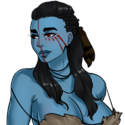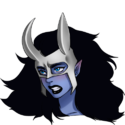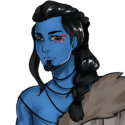Difference between revisions of "Jotuns"
(→Characters: reformat) |
m (Grey -> Gray) |
||
| Line 23: | Line 23: | ||
'''Skin:''' Most jotuns have skin in shades of deep blue or cobalt, though ice-blue individuals and on rare occasion even purple giants are known to exist. | '''Skin:''' Most jotuns have skin in shades of deep blue or cobalt, though ice-blue individuals and on rare occasion even purple giants are known to exist. | ||
| − | '''Hair:''' Typically black, with less common shades of | + | '''Hair:''' Typically black, with less common shades of gray or dark blue. Very rarely, red or blonde. Whatever their coloration, jotun hair is thick, shaggy. Males are able to grow prodigious beards, and have dense body. |
'''Eyes:''' Red. | '''Eyes:''' Red. | ||
Revision as of 03:09, 19 November 2024
"Damn, you're a big boy. How's the weather up there?"
—Phyaxos of Tychris, salamander adventurer, moments before his death.
Writer Credit
| Savin |
|---|
|
Codex
Name: Jotun(s). More commonly known as Frost Giants.
Sexes: Males, females, and hermaphrodites.
Height: Jotuns stand 13 to 15 ft. tall, with males averaging about a foot taller than females.
Weight: Jotuns are massive beings, with weights to match. Scholars estimate they must weigh at least 2,000 pounds if not more.
Skin: Most jotuns have skin in shades of deep blue or cobalt, though ice-blue individuals and on rare occasion even purple giants are known to exist.
Hair: Typically black, with less common shades of gray or dark blue. Very rarely, red or blonde. Whatever their coloration, jotun hair is thick, shaggy. Males are able to grow prodigious beards, and have dense body.
Eyes: Red.
Ears: Jotun ears are human-like, though it isn't too unusual to find individuals with pointed or even frilled ears, indicating mixed-race ancestry.
Lifespan: It is believed that jotuns live for about one hundred and fifty to two hundred years, though elder giants are rarely if ever encountered.
Maturity: 30 years.
Description
Jotuns are titanic humanoids native to the world's polar reaches, both north and south, where they live in relative isolation in tribes of semi-nomadic hunters. The stereotypical jotun ranges from four to five yards tall, is broad-shouldered and well muscled regardless of sex, and girded in the hides of polar bears and walruses, wielding weapons of stone and bone.
They are a primitive folk, living beyond even the reach of Belhar in its height, and theirs is a land desolate of resources. Yet the giants rarely stray far from the frigid poles. Scholars speculate that the sheer size of the bodies means that they require cold climates to keep from overheating... though others point to dragons and centaurs as proof to the contrary. Regardless of the reasons, frost giants have spent most of history on the very fringes of the known world, and display little inclination to change their ways in that matter. Even during the Godswar, the jotuns answered the appearance of otherworldly terrors by simply going further north, where the Wraiths' minions would freeze to death before having a chance to harm the giants.
The one region where the jotuns were once studied and examined was the glacial region north of the old Boreal Elven kingdom. Here, the giants ranged south far enough to interact with boer'alvar and frostscale salamander hunters, and eventually Belharan scholars interested in researching the world's largest humanoids.
Reproduction
Frost giant reproduction is carried out in the human-standard means: males and females copulate, and the female carries a child to term for about a year. Jotuns have sexual organs similar in shape and function, if not in size, to humans. About 10% of the jotun population is believed to be hermaphroditic: that is to say, female in figure but possessing both sets of genitalia. Hermaphrodite jotuns are believed by their kin to be both more virile and fertile than mono-sexed giants, perhaps nature's answer to the race's low birth rate.
The harsh conditions and scarce resources of the polar regions means that jotun fertility is rather low at the best of times, but certainly not from lack of trying. Owing to the severe cold of their natural habitats, jotuns are quite keen to share their blankets and body heat whenever and where-ever the opportunity presents itself. Stories abound of smaller hunters nearly freezing to death in the arctic, only to be swept up and saved by vigorous warming-up from a frost giantess.
Jotun pregnancies almost always result in single births, as the child's size causes significant strain to the mother; twins and triplets aren't unheard of, but they are dangerous and taxing pregnancies. When a female jotun falls pregnant, she withdraws to her tribe's village where the community will work together to support her. Jotuns don't tend to form mated pairs, and given their promiscuity, it's often a total unknown who the father is — but with children being so rare, young jotuns are given the attention of their entire tribe from even before their born.
Perhaps surprisingly, given their stature, jotuns are capable of breeding with smaller races. Boreal elves and frostscale salamanders are the most common partners taken by the frost giants, and in almost all cases (for the obvious reason of survivability), it's a pairing of a female giant and a smaller sire. Halfbreed pregnancies are much faster, safer, and more comfortable for the mother in these cases, and the resultant giants lose little in the way of stature by the time they are adults, even if they are somewhat scrawny-looking as children.
History
Jotuns appear only rarely in actual recorded history. Most mentions of them that Belharan heartlanders would know come from ancient mythology, where it is said that the world was once much colder and the jotuns ranged far further afield from their polar homes. Certain scholars even speculate that there might once have been an empire of the giants stretching across the northern continent and into the Sailgrave Archipelago, reigning long before the great human and elven kingdoms first arose before falling as the world warmed. If true, these prehistoric giants left no trace of themselves that modern sages have uncovered.
Like other polar races, jotuns record their own history in oral tradition and epic sagas rather than as written word. Indeed, writing is quite rare in the poles: there are few trees for paper-making, and what stone is found is better purposed towards weapons and tools than tablets. The giants, too, sing of forgotten glories and fallen kingdoms; of a great war with the dragons in the days when the world was cold and the sky was darkened by draconic prides. Their sagas speak of innumerable heroes, and a pantheon of gods bearing different names than those of the mainland races.
Society & Culture
Frost giants maintain a society organized into small filial tribes of semi-nomadic hunters. The jotuns follow herds of great hairy mammoths, or go whaling from aboard titanic longships — often with the help of selkie guides and outriders, with whom they frequently share hunting grounds. Jotuns are gregarious with the other polar races, freely cooperating when the opportunity arises: while they may share territory, what feeds a selky or siorc is rarely of interest to a jotun, and what beasts a jotun clan might stalk are far too mighty for any other race to risk facing. It's said that in the distant past, jotuns even hunted dragons. Those tribes that could fell a great firebeast would eat like kings for a month, and come to battle clad in scale armor and bearing dragonbone arms that made them nigh invincible.
Jotuns are much less welcoming to outlanders, though different tribes may take approaches in their interactions with their warmer neighbors ranging from secretive to openly hostile. Boer'alvar history tells of several conflicts between their warg-mounted warriors and the great jotuns of the Rift, bitter blood-feuds over hunting ground and water sources. Encountering a group of jotuns is much more likely to result in conflict than finding a single individual, as among their own kind, is considered the greatest shame to back down from the slightest perceived challenge or disrespect.
Still, those adventurers who learn the giantish languages and customs will find that frost giants have a deep sense of honor and hold their word, once given, to be the most important bond that can be given.
Jotuns have their own pantheon of gods they worship, centered around their goddess of blizzards and the tundra they merely call the Maiden of Frost. Belharan clerics posited that this was an aspect of Sorra, turning the wrath of her storms and howling winds to a colder mein. The jotun gods are worshipped by nowhere and by no one else known today.
Codex Acquisition
Only one of the conditions below must be met to unlock the Jotuns Codex entry:
- Encountering Sigrune near the Ancient Archway
- Encountering the Glacial Rift Jotuns
Other Information
Transformatives
No such transformative items exist yet
Characters
| Frost Pupper (half-lupine) 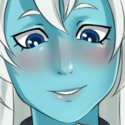 Jotun Giant-Father Jotun Giant-Father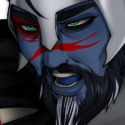 Liulfr Liulfr(half-lupine) 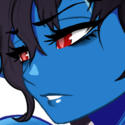 Thrud Thrud(valkyrie)(half-boreal elf) 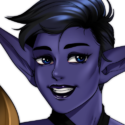
|
